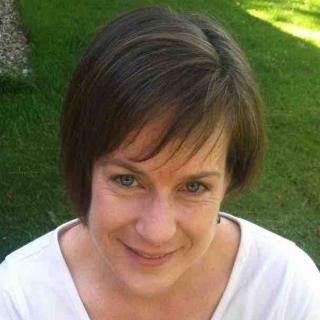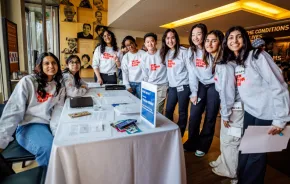
In a two-story, former community center on a side street of Seattle’s International District, school is in session.
There are the 10th-grade math students, scattered around the common area that doubles as a cafeteria, using marbles and rules to measure the relationship between height and distance. Language arts students begin writing personal narratives, relying on “life graphs” they drew the week before. And in biology, ninth-graders are learning how to find credible sources for an assignment on evolution. Their teacher, Camden Hanzlick-Burton, gives students (their headphones at the ready) a couple of minutes to find their music playlists before they dive in.
Music helps many of them focus, Hanzlick-Burton explains, and at this school, teachers have decided to adopt routines before determining certain rules. In other words, rather than dictate a series of “don’ts” at the outset, wait and see which ones are actually necessary. Meanwhile, students are able to direct themselves, to a certain extent, on assignments through “personalized learning plans” that teachers regularly update to reflect progress on skills and concepts.
All this comes on a typical Tuesday at Summit Sierra, one of eight charter schools serving nearly 1,700 students statewide in Washington. Despite the lawsuit filed against Washington’s charter school law over the summer, there is no evidence of the controversy here. It’s business as usual at this and other charter schools, where advocates, staff and parents say they’d prefer to focus on their mission: educating kids. But now, with President-elect Donald Trump’s pick for education secretary— Michigan billionaire and charter-schools backer Betsy DeVos — these alternatives to traditional public schools are back in the spotlight.
Pros and cons
The lawsuit was the latest — and, people on both sides of the issue will say, not entirely unexpected — step in the efforts to establish charter schools in Washington.
Generally speaking, charter schools are publicly funded schools run by private agencies. Currently, 43 states have laws permitting charter schools; nationwide, some 6,800 charter schools serve 2.9 million students, according to the National Alliance for Public Charter Schools (NAPCS).
Students thrive academically when they’re cared for and loved, where they’re heard and seen.
The issue of charter schools has been more divisive in some states than others, but in simplest terms, supporters and opponents cite the same concerns: Proponents believe charter schools provide options for students who struggle in the traditional school setting, and for families who simply want an alternative to their neighborhood public school. Opponents contend these schools deprive the thousands of students in a state’s K–12 system of resources, sending public money to institutions that function as private entities.
Beginning in 1996, Washington voters rejected charter schools measures three times before approving by a barely-2-percentage-point margin Initiative 1240 in 2012. That initiative, sponsored by a cross-section of groups that included the League of Education Voters and Democrats for Education Reform, permitted up to 40 schools over the next five years. A coalition of organizations filed suit, while charter school providers from around the country began to make plans for establishing a beachhead in Washington.
Then, as nine charter schools in Seattle, Kent, Tacoma and Spokane kicked off the 2015–16 school year, the Washington State Supreme Court ruled that the charter school law was unconstitutional, determining that state tax dollars shouldn’t be used to finance the schools. In response, the Legislature earlier this year passed a bill, primarily with Republican support, that allowed charter schools to use lottery proceeds instead.
The August lawsuit filed by the Washington Education Association (WEA), El Centro de la Raza and other organizations claims the use of lottery revenue masks the use of public money. The groups also say the Legislature’s effort to accommodate charter schools ignores the state’s “paramount duty” of providing adequate funding for K–12 education. That issue is now pending in a case before the state Supreme Court, McCleary v. State of Washington.
Rich Wood, spokesman for the WEA, says that rather than try to address that issue, lawmakers diverted “public money to privately run charter schools that are not accountable to Washington voters.” Using lottery proceeds is the same as dipping into the general fund, he says.
“It’s unfortunate that the legislature tried to fix a flawed, unconstitutional law, instead of funding education for all kids,” he says.
State Sen. Steve Litzow, R-Mercer Island, a co-sponsor of the lottery-funding bill, calls that argument a “union red herring.”
Charter schools opponents — especially the teachers union, Litzow says — have a “wildly misplaced concern” about a handful of institutions serving a fraction of the state’s students.
“The current system works for a lot of kids, but not every child, and if our goal is to make sure that every child in Washington has the opportunity to be successful in school, we need to start finding ways to educate all the children,” says Litzow, who lost his re-election bid in November. “These are kids that want to go to these charter schools. Are they going to be for everybody? No, but for these kids, they work .”
State Sen. Mark Mullet, D-Issaquah, also supported the lottery-funding bill. Legislators knew that no matter what they approved, “it would be challenged,” he says. But he believes charter schools deserve a chance to be successful.
The upcoming legislative session will require a focus on education funding, he adds, and again, charter schools must be factored in.
“Every public school student needs a guaranteed amount of resources, and every one of these charter schools has been blocked from local levy dollars, so we need to come up with system that’s fair for every kid,” Mullet says. “We have to get beyond the philosophical opposition to charter schools.”
The current fight over charter schools in Washington is similar to battles being waged in Louisiana and Mississippi, where litigants are challenging how those states are funding charter schools, says Todd Ziebarth, senior vice president for government relations at the NAPCS. Even in states where there is broad bipartisan support for charter schools, the issue is contentious.
“It’s essentially creating a new pathway for individuals to start public schools outside of a monopolistic system of school districts providing schools,” he says. “There are exceptions where leaders view charters as an opportunity to provide different options, and we’re thrilled to see that, but more often than not, districts, administrators and unions view them as a threat.”

The expansion of charter schools throughout Washington
With the debate over Washington’s charter schools a lingering backdrop, eight schools have begun their second year. A ninth school, First Place, reverted to private-school status last year. In 2017-18, another three schools are scheduled to open — two in greater Seattle and one in Walla Walla — while interest is growing in Yakima, the Tri-Cities and Vancouver, says Joshua Halsey, executive director of the Washington State Charter Schools Commission, the agency charged with oversight.
Going forward, charter schools still have to grapple with funding. Removing access to local levy money — not to mention the inability of charters to pass construction bonds or access state matching funds for construction projects — and charter schools have a lot to figure out on their own.
“When we talk about equitable funding for charters, quality becomes a challenge,” Halsey says.
But there is much to be excited about, he adds. Scores from several of the charter schools that took the spring 2016 Smarter Balanced Assessment met or exceeded state standards. A few schools have waiting lists. And many have expanded their parent and community outreach to include the school districts themselves, trying to formalize those institutional relationships.
Shortly after this school year began, the Washington State Charter Schools Association joined the state’s motion to dismiss the August lawsuit. At the same time, schools are staying focused on their mission, says Maggie Meyers, the association’s spokeswoman. Most are located in diverse neighborhoods, where a high percentage of students qualify for free or reduced-price lunch, and may run for a longer instructional day. Some focus heavily on STEM instruction, project-based learning, or incorporating the arts into everyday lessons.
Washington’s charter schools also have tried to focus on establishing good relationships between school staff and students, Meyers adds. While charter school in some states are known for a “no excuses,” strictly academic approach, she says, Washington’s schools have made a concerted effort to create school community.
“Students thrive academically when they’re cared for and loved, where they’re heard and seen,” she says.
Providing an alternative option
It’s the start of the school day at Rainier Prep, a charter school just outside the Burien city limits. But there is no bell. Instead, the swashbuckling theme from The Pirates of the Caribbean plays through the loudspeaker. The 255 fifth-, sixth- and seventh-graders scurry up and down the stairs to get to their first class, reading. All teachers, no matter their subject area, participate in the morning literacy block, whether to work with small groups on decoding words, or larger, more independent literature circles based on a chosen book.
I just believe every kid deserves a great public school in their neighborhood, but for some kids, that’s just not the case.
The all-staff participation in reading is a new project this year, Principal Maggie O’Sullivan explains, designed as both a means of teacher development, improve student skills and begin the day in a calming, consistent way.
Housed in a former Catholic school building in the Highline School District, Rainier Prep is O’Sullivan’s creation, though she gives teachers credit for its successes. A former public school teacher and principal in Tukwila and Federal Way, O’Sullivan says she had been thinking for years about how to improve education, especially for children in the underserved neighborhoods of South King County.
“I just believe every kid deserves a great public school in their neighborhood, but for some kids, that’s just not the case,” she says.
So when the charter schools law was passed in 2012, O’Sullivan studied schools across the country and solicited community input for their educational priority. The answer: a middle school alternative. Rainier Prep opened a year ago, dedicated to a college-preparatory curriculum for grades five through eight. (The eighth grade will be added next year.)
It turned out to be just what Chelsea Doran was seeking for her daughter, Sydney Goitia, now a sixth-grader.
Charter schools weren’t on the radar, Doran explains — she didn’t even vote for the 2012 measure — but the emphasis on college readiness at Rainier Prep got her attention. Now, both mother and daughter are pleased with the results.
“We probably would have been fine if we’d never gotten into the charter world,” Doran says. “But the proactiveness of the program has turned Sydney into the highest level of performer, instead of constantly settling for the minimum expectation of what is required.”
Sydney says that last year, she was a little nervous to start fifth grade at Rainier Prep, but she was open to trying something new. At her old school, for example, she was often tapped to help other students when she was done with her work. “But I’m not a teacher,” she says simply. “I wanted work that would be more challenging for where I was at.”
She believes she has those opportunities now.
“They find what’s right for you, personally,” she says, recalling how she didn’t know much about charter schools before she enrolled in one. “Once I got to know the situation, it was perfect.”











